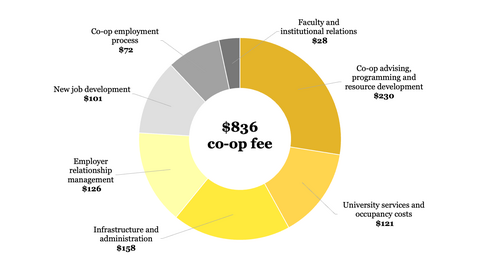
What is the co-op fee for?
Your student-paid co-op fee funds the delivery of the co-op program at Waterloo. Like tuition, this fee is required for all students enrolled in a co-op program.
The co-op fee is not a job-finding fee per work term. It is a pro-rated fee that, throughout a student's degree, recovers the full costs associated with running the co-op program.
The costs of running the co-op program include staff salaries and benefits, space occupancy (e.g. heat, electricity), technology, supplies, marketing and advertising, and other job development costs. Co-operative Education practices fiscal responsibility and works to reduce costs to keep the co-op fee as low as possible while delivering a quality co-op program.
The co-op fee is the primary source of funding for Co-operative Education. Other funding sources outside of the fee are used for specific projects (e.g. donations for the Co-op for Community program fund student salaries to work at non-profit organizations).
As a co-op student, you pay the fee in installments throughout your time at Waterloo. All undergraduate students in a co-op program pay the co-op fee. All graduate students in a co-op program supported by Co-operative and Experiential Education (CEE) pay the fee.
Your 2026/2027 co-op fee
- The co-op fee for 2026/2027 is $836, an increase of $19 or 2.4% from the 2025/2026 fee.
- The fee change reflects increased costs due to inflation and annual salary increases.
- Like the rest of the institution, Co-operative Education is reducing expenses.
- Learn more about our annual co-op fee review process, which includes communications with student representatives.
2026/2027 co-op fee
Your 2026/2027 co-op fee amount and breakdown
The co-op fee amount for 2026/2027 is $836. This amount represents a $19, or 2.4%, increase from 2025/2026.
Co-operative Education determined this amount using our annual financial analysis and fee-setting process, which includes student consultations. The fee was approved by the Board of Governors in February 2026.
As a co-op student, you’ll pay the co-op fee multiple times throughout your degree. Your academic program determines when the co-op fee appears as a charge on your account in Quest. The cost of participating in co-op is spread throughout your degree to minimize the fees you’ll need to pay in any given term.
We are committed to transparency, fiscal responsibility and providing accurate and up-to-date information about your co-op fee on this page. If you have questions about your co-op fee, please use this form.
How is the co-op fee set?
CEE reviews the co-op fee each year to align with projected costs and determine whether an increase is needed. Factors such as inflation/costs, improvements in service and salary changes can influence the amount of the co-op fee each year. The co-op fee review process includes consultation with students and input on the services that the co-op fee funds. Learn more about the review process.
Across CEE, we continuously work to reduce our costs and practice fiscal responsibility to keep the co-op fee as low as we can while delivering a quality co-operative education program.

Co-op fee by program
The number of times you pay the co-op fee varies by program. The co-op fee is associated with your enrollment in the co-op program (like tuition). It is not a "job-finding fee" per work term. Instead, it represents the cost of running the co-op program and is spread out over a number of terms.
The following information shows when you’ll start to pay the fee and for how many times you’ll need to pay the fee (per program) throughout your undergraduate or graduate career. If you don’t see your CEE-supported graduate program listed, check out the information for graduate students section for a list of graduate co-op programs supported by their respective program/department.
If you extend your program for additional academic terms, you will not pay additional co-op fees. The number of times you pay the fee (per program) is shown in the “Total times paid” column below. You can get an estimated total cost by multiplying the current fee by the number of times you pay. For example:
- $836 x 8 = $6,688
- $836 x 6 = $5,016
- $836 x 5 = $4,180
- $836 x 4 = $3,344
- $836 x 3 = $2,508
- $836 x 2 = $1,672
Note: The $836 co-op fee amount is for the 2026/27 fiscal year only (May 1, 2026 to April 30, 2027) - it is reviewed annually and is subject to change. Visit the Tuition Fee Schedule to find out your fees based on your program and the current term.
See when and how often you pay based on your faculty and program:
How the co-op fee is determined and set each year
We’ve outlined the process and dates used to set the 2026/2027 co-op fee amount of $836.
| Time | Item |
|---|---|
| Spring/fall term | Perform financial analysis; including
|
| Fall term | Review and consult stakeholders about the proposed fee
|
| Fall term | Share proposed fee with students through councils and committees
|
| January | Send fee proposal to Board of Governors for review. |
| February | Vote on fee proposal at Board of Governors meeting. |